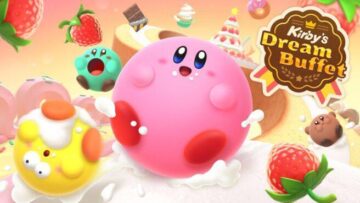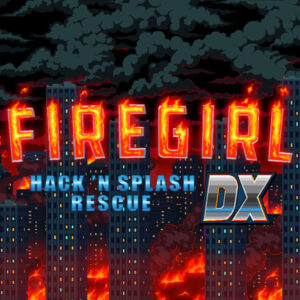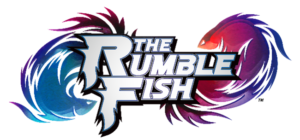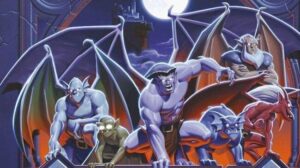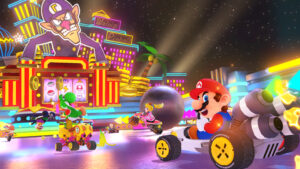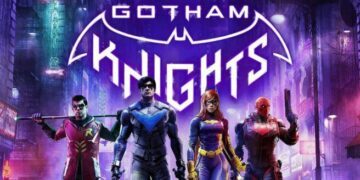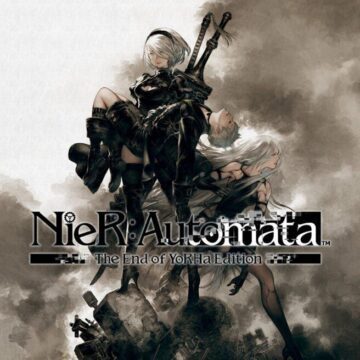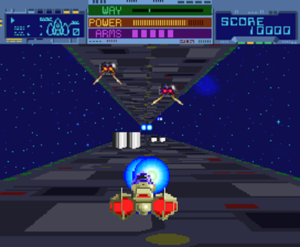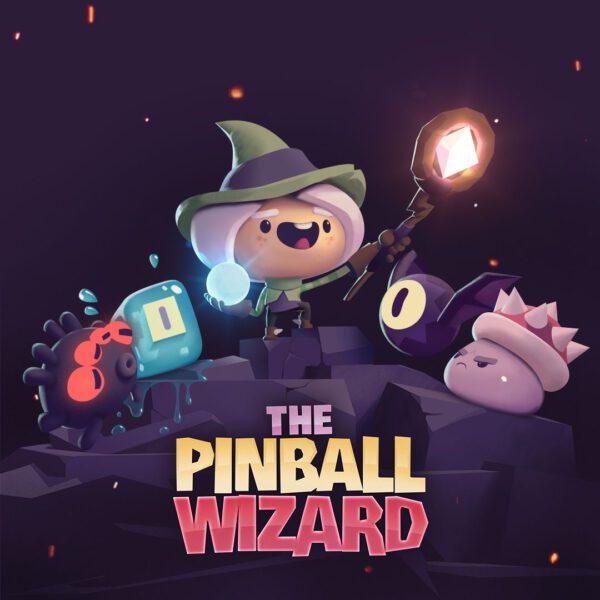
Guest review by McPortugalem
I never quite got the appeal of pinball as a child. I, like many kids my age, got introduced to the game with Space Cadet on Windows XP and I was never very good at it. For years, Pinball was relegated only to my near monthly replays of Sonic Adventure and little else; a bonus stage of sorts, a pre-order bonus in Sonic Generations–that sort of thing. Pinball is a game that requires much skill – one that I was pretty bad at. It would have continued that way were it not for my friend, Indie Gamer Chick, who got me to give it a second chance. Suddenly, I could see how there were tactics and skills involved. I could see how flicking the flipper at the right time put the ball in the exact same spot every time and I got obsessed enough that I’ve used my Switch for Star Wars Pinball almost exclusively.
So when ROG gave me the chance to review Pinball Wizard, I approached it with a swagger that would soon be challenged. After all, I considered myself pretty good at pinball games – not a world record-setting, but I could keep the high points rolling. Pinball Wizard made me realize that maybe I’m not as good as I thought I was. It is also, I have to admit, probably my favorite indie game that I’ve played in the last two years and a high contender for a game I’ll be replaying often.
In Pinball Wizard, you.. well, pinball your way through stages set in a tower. Hitting enemies, setting off traps and navigating your wizard (that acts as a ball) so as to eventually move on to the next stage. Dropped enemies have a chance of dropping a key that you acquire and, by precisely hitting them over and over again in what is essentially digital whack-a-mole, you can progress.
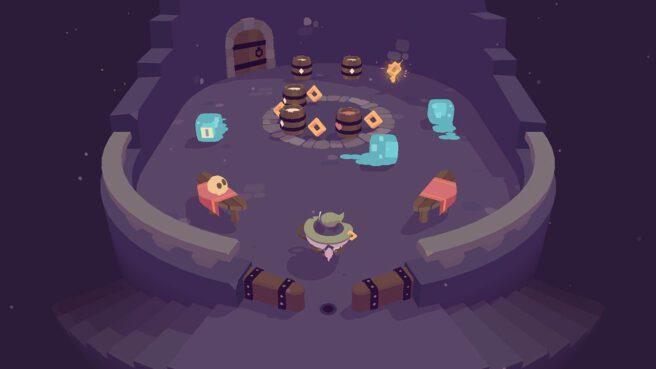

It sounds simple, and it is – at first, that is – until enemies start getting into a defensive state when hit or approached; such as slimes that turn into fiery versions of themselves, and Koopa lookalike enemies that sneak back into their shells. That’s when you’re required to experiment. Sometimes, it’s not about how often or how fast you hit them, but about knowing when to hit them and when to retreat. Hitting an enemy when they’re in their defensive state can take up almost half of your health, and most of my deaths happened by hitting an enemy and then not getting away quickly enough. It’s brutal and punishing, and I think the developers realized how hard it was; as a lot of the latter stages don’t feature much in the way of stage hazards, but are instead just circles with enemies that you have to make sure you don’t hit seconds after hitting them a first time – even as you’re dragged down by gravity.
Such a task would be much harder if not for the fact that, in a roguelite fashion, when you die you level up with the experience gained from the enemies you killed. Doing so not only ticks a counter up but also grants you access to abilities – some of which I found particularly useful. The first and probably most important one you’ll get is the dash. It allows you to stop your momentum and dash off in a direction of your choosing. It’s handy not only to close the distance between you and enemies or to reach the end of the level door (when the room is a semi-circle and you keep sliding away from it) but also for quick retreats when things get spiky. It can be very satisfying getting it just perfect and making a combo of quickly hit enemies that die by your hand ranks but, of course, with it being so fast it can also if misused, place you right in the path of danger or make you bounce right back to what you were trying to avoid. It’s a skill you’ll often use, but it’s one that can lead to several deaths and frustrations.
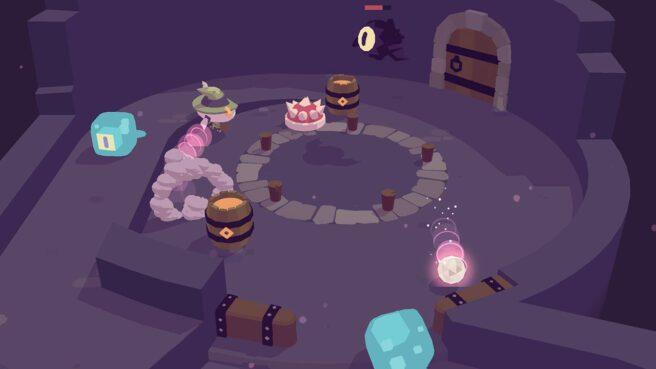

As exhilarating and amazing as pulling off a combo can feel, as the levels get harder and harder, you’ll eventually learn that the only way to progress is to time your shots correctly and aim accurately. A typical late-stage session for me involved hitting an enemy, waiting for him to start damaging me on contact if I hit back, hold my ball with my flippers and then throwing the ball when they finally went back to being damageable. Writing it out does not seem fun, and I make it seem like a waiting game where all you can do is hit, wait, and hit again but there’s often so much going on at the stage at one point that you rarely have a moment’s rest.
From spider-like enemies that throw spider webs at your flippers and blocking them in the position they’re in (and where you must rapidly press the swing flipper button to get it unglued) to enemies that fly above the level and you must hit their projectiles back at them under a certain time limit to damage them, the game keeps you on your toes. Part of it is the design, because I think the developers anticipated my tactics. How could they not? After a couple of levels where I took things slow and decided where to throw my little wizard with accuracy, they surprised me with bombs being thrown near the flippers so that I had to have him in movement at all times. When I finally start getting the hang of it, they place rotational platforms so that going too fast makes you take damage by swinging you right into an enemy – and not one I could defeat easily.
Really, short as Pinball Wizard might be (and that is my main complaint with it as I beat it in less than three hours only to then replay it for fun), the level design stays consistently engaging and challenging. It’s not so much that there’s a lot to the game in terms of variety – there really isn’t – but the many uses that the developers gave the mechanics at hand all working in tandem with the level design make it a memorable experience. Whenever I thought I was getting the hang of the game and dominating its mechanics, something old would be presented in a new way that it felt like an entirely new challenge was upon me. It’s a devious, terribly clever little game and one that remained challenging to the end. Maybe I’m not the pinball ace I thought I was, but Pinball Wizard remained fun even despite the fact.
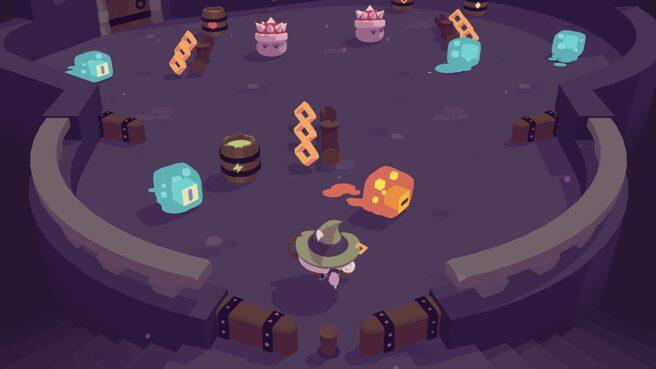

As short as it is, Pinball Wizard is worth a play – perhaps even two or three. I certainly know I’m keeping it installed on my Switch for those 5-minute wait times at the subway, where I can attempt to beat just one or two stages in that short time. The game is good in short bursts – even if I beat it in one sitting. I definitely recommend Pinball Wizard. It was a very good time.
Disclaimer: A review key was provided
- amazon prime gaming
- axie infinity
- Casino Games
- coingenius
- EA Sports
- Evil Geniuses
- featured
- Gaming
- gaming headset
- gaming pc
- madden nfl
- news
- Nintendo
- Online casino games
- pc games
- plato
- plato ai
- plato data intelligence
- plato game
- plato gaming
- platodata
- platogaming
- playstation
- prime gaming
- review
- Reviews
- ROG
- ROG News
- Team SoloMid
- the pinball wizard
- xbox
- zephyrnet
